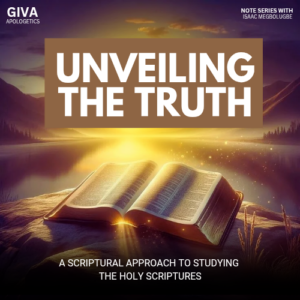
Unveiling the Truth: A Scriptural Approach to Studying the Holy Scriptures
Isaac Megbolugbe
January 6, 2025
Introduction
The Holy Scriptures are the foundation of the Christian faith, offering guidance, wisdom, and hope to believers. The Holy Scriptures provides a broader framework of knowledge about faith and worship and it also predated the 66-book cannon that came from the Roman Catholic Church. Furthermore, the pursuit of understanding the Scriptures can be hindered by the influence of man-made knowledge. This article explores the importance of relying solely on the written Holy Scriptures, within their linguistic and historical context, to uncover the truth about faith and worship.
The Apostle Paul’s Wisdom
In Romans 15:4, Apostle Paul emphasizes the significance of the Scriptures, stating, “For everything that was written in the past was written to teach us, so that through the endurance taught in the Scriptures and the encouragement they provide we might have hope” (NIV). This verse highlights the importance of studying the Scriptures to gain hope and understanding.
The Language of the Holy Scriptures
Mastering the words, precepts, concepts, principles, practices, and wisdom of the Holy Scriptures is crucial for a deeper understanding of faith and worship (2 Timothy 2:15). This mastery must be achieved within the framework of the ancient prophets’ and apostles’ understanding, untainted by subsequent man-made knowledge and wisdom (Proverbs 30:5-6).
The Pitfalls of Man-Made Knowledge
Relying on historical knowledge, philosophy, theology, and popular writings can lead to a distorted understanding of the Scriptures (Colossians 2:8). Even revelations and rethinking from modern leaders and scholars can sometimes deviate from the original intent of the Scriptures (2 Peter 1:20-21).
Conclusion
By relying solely on the written Holy Scriptures, within their linguistic and historical context, believers can gain a deeper understanding of their faith and worship. Unshackled from the constraints of man-made knowledge and the 66-book cannon, known as the Bible, we can uncover the truth and hope offered by the Holy Scriptures, as Apostle Paul so eloquently stated.
References:
– Holy Bible (NIV, ESV)
– The Bible Knowledge Commentary (Walvoord & Zuck, 1983)
– The Expositor’s Bible Commentary (Gaebelein, 1976)
– The New International Commentary on the New Testament (Gordon Fee, 1995)
– The New International Commentary on the Old Testament (Gordon Wenham, 1979)